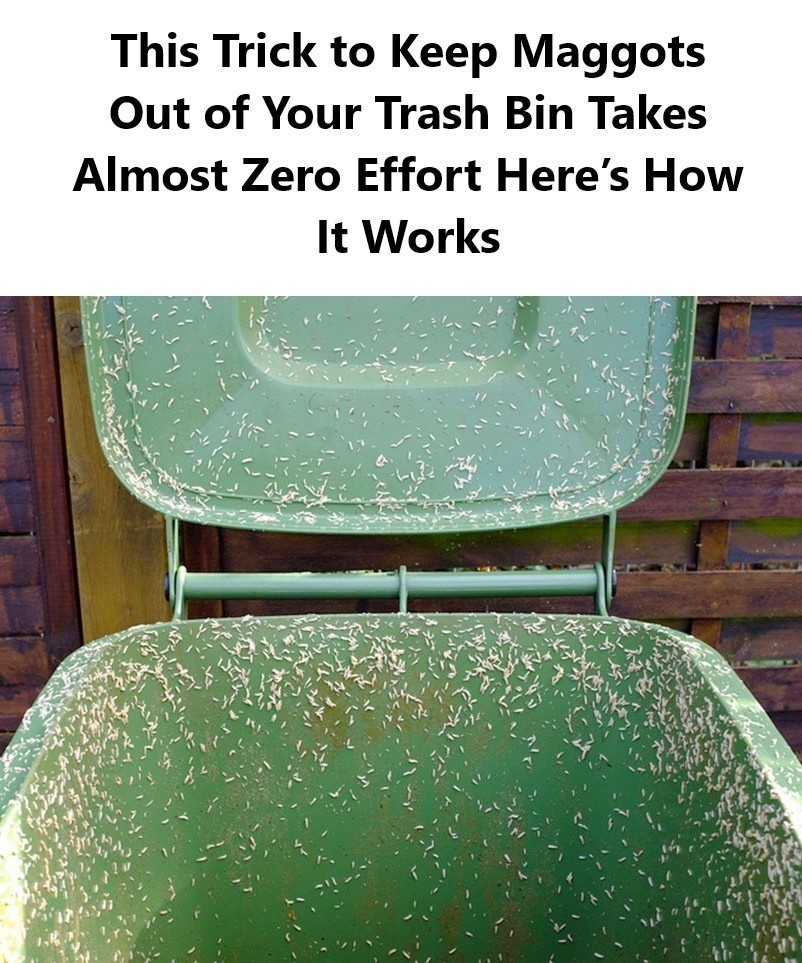ADVERTISEMENT
3. Empty the Trash Regularly
Don’t let trash sit in your bin for too long, especially in warmer weather. The longer food waste sits, the more likely it is to attract flies. Make a habit of emptying your trash bin regularly—at least once a week, or more frequently during hot months. If you can’t take your trash out right away, try storing it in a sealed plastic bag until it’s time for pickup.
4. Clean Your Trash Bin Frequently
Keeping your trash bin clean is another key factor in preventing maggots. Over time, spills, leaks, and bits of food can accumulate at the bottom of your bin, attracting flies. After each trash pickup, rinse out your bin with hot water and soap to remove any food residue. For a more thorough clean, you can use a cleaning solution with vinegar or a disinfectant that will help eliminate odors and any potential fly attractants.
5. Sprinkle Salt or Diatomaceous Earth in the Bottom of the Bin
To deter maggots from taking hold in the first place, consider sprinkling salt or diatomaceous earth at the bottom of your trash bin. Both of these substances help to dry out any moisture that might attract flies and can make the bin a less hospitable environment for larvae. Just be sure to keep the bin dry and avoid excess liquid waste in the future.
6. Use Natural Fly Repellents
There are several natural repellents you can use to keep flies away from your trash bin:
- Essential oils: Flies are repelled by scents like lavender, lemongrass, and eucalyptus. You can make a simple spray by mixing a few drops of essential oil with water and spraying it around the edges of your trash bin.
- Cinnamon: Flies are also deterred by the scent of cinnamon. Sprinkle some cinnamon powder inside your trash bin to keep flies at bay.
- Bay leaves: Toss a few bay leaves into your trash to prevent flies from settling in.
7. Consider Using a Trash Compactor
If you generate a lot of waste and have issues with trash overflow, a trash compactor may be a good investment. These machines crush your trash, helping to reduce the volume and create a more tightly packed container. A compactor will also limit the exposure of food waste to the open air, making it less likely that flies will lay eggs.
8. Cover Your Trash in Hot Weather
During hot months, the combination of heat and food waste creates a perfect storm for maggots. If you notice an increase in flies around your bin, consider covering the trash with a heavy cloth or tarpaulin to protect it from flies. This is especially important if your bin is placed outside or in an area prone to fly activity.
What to Do if You Find Maggots in Your Trash Bin
Even with the best prevention methods, there’s always a chance that maggots might appear in your trash bin. If you find maggots, here’s what you can do to eliminate them:
- Remove the Trash: Immediately take the trash out of your bin and seal it in a plastic bag.
- Clean the Bin: Wash your trash bin thoroughly with hot, soapy water and disinfect it with a solution of vinegar or bleach.
- Eliminate the Maggots: If there are maggots in the bin, you can pour boiling water over them to kill them. Alternatively, use diatomaceous earth to dehydrate the larvae.
- Check for Sources: After cleaning, inspect your trash bin and the surrounding area for any food waste or other attractants that might have caused the maggot infestation.
Final Thoughts
While maggots in your trash bin are unpleasant, they’re also preventable. By following these simple tips—properly sealing your food waste, keeping your bin clean, and using natural repellents—you can avoid the hassle of dealing with maggots altogether. Staying on top of your trash management routine will not only keep your home pest-free but will also ensure that your trash doesn’t become a breeding ground for flies.
So, remember: a little effort goes a long way in keeping your trash bin and your home clean and maggot-free!
ADVERTISEMENT
ADVERTISEMENT
